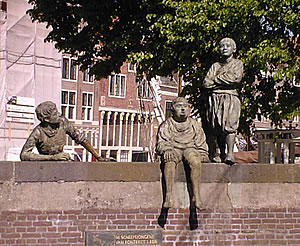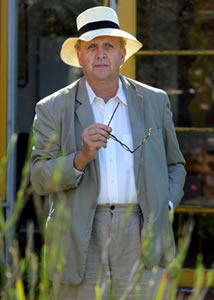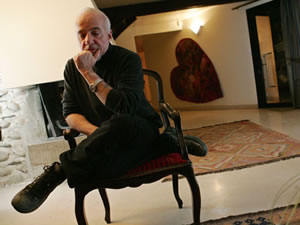|
De Nederlandse schrijver Johan Johannes Fabricius werd op 24 augustus 1899 in Bandoeng in Nederlands-Indië geboren. Zie ook mijn blog van 24 augustus 2006 en ook mijn blog van 24 augustus 2007 en ook mijn blog van 24 augustus 2008 en ook mijn blog van 24 augustus 2009. xml:namespace prefix = o ns = "urn:schemas-microsoft-com:office:office" />
Uit: De scheepsjongens van Bontekoe
Baas Wouter meesmuilde.
Maar zijn gezicht betrok toen zijn boze vrouw de smidse binnenstoof en snauwde: Ben je doof? D'r is al driemaal volk geroepen in de winkel, en m'n bieten staan aan te branden!
De hoefsmid uit De IJzeren Man keek verbluft naar de deur, die alweer met een slag dichtgevallen was, zette toen grommend de voorhamer neer. Peter Hajo bleef alleen, - tuurde in de vlammen van de oven.
Kom maar eens terug als je zestien bent... - Over twee jaar! Alsof hij niet het werk van een zestienjarige jongen zou kunnen doen! Hij zétte het alle zestienjarige jongens in Hoorn om die bout vast te houden zoals hij dat daareven had gedaan! Was er één bij, die hem aandurfde? Had hij Peer den Vos geen pak slaag gegeven als hij in zijn leven niet had gehad, omdat hij (zonder het te vragen!) in de bijt was gaan vissen die Peter Hajo in het ijs had gekapt? Peer den Vos, die wel een hoofd groter was dan hij!
't Was een gemene streek om hem als landkikker te laten rondspringen, hem, die, toen hij nauwelijks lopen kon, de touwen die de binnenzeilende vissers zijn oudere vrienden toewierpen al met een echte zeemansknoop om de meerpalen sloeg; hem, die zich op z'n vijfde jaar stiekem in vaders botter had verscholen en mee ter haringvangst was gegaan!
Hoe snakte hij ernaar op zee te zwalken zonder een streepje land mijlen in de omtrek; hoe snakte hij ernaar de wijde wereld te zien en met echte zeebenen terug te komen en op te snijden net als die bruingebrande pikbroeken die met Jan Pieterszoon Coen naar de Oost waren getogen en nu de waarheid spraken of logen, juist als het hun inviel, zonder dat een landrot zeggen kon: Je zuigt uit je duim! - De Oost... daar was voorlopig helemáál geen kans op. Misschien later, als hij eerst een paar reizen met een walvisvaarder had gemaakt; als het vel van zijn handen was gebarsten door het zout; als de traanlucht in z'n haar en in z'n kleren hing, - misschien zouden ze hem dan willen meenemen. Jandorie! Peter Hajo zag een beeld opdoemen van bergen, fladderende papegaaien, dansende wilden, van apen, tijgers, krokodillen...
Weg was het beeld.

Johan Fabricius (24 augustus 1899 21 juni 1981)
Beeld van de scheepsjongens van Bontekoe door beeldhouwer Jan van Druten in Hoorn.
De Schotse schrijver en jurist Alexander McCall Smith werd geboren in Bulayawo in het toenmalige Rhodesië (nu Zimbabwe) op 24 augustus 1948. Zie ook mijn blog van 24 augustus 2009.
Uit: Corduroy Mansions
Passing off, thought William. Spanish sparkling winefilthy stuff, he thought, filthypassed itself off as champagne. Japanese whiskyGlen Yakomoto!was served as Scotch. Inferior hard cheesefrom Mafia-run factories in Cataniawas sold to the unsuspecting as Parmesan.
Lots of things were passed off in one way or another, and now, as he stood before the bathroom mirror, he wondered if he could be passed off too. He looked at himself, or such part of himself as the small mirror encompassed-just his face, really, and a bit of neck. It was a fifty-one-year-old face chronologically, but would it pass, he wondered, for a forty-something-year-old face?
He looked more closely: there were lines around the eyes and at the edge of the mouth but the cheeks were smooth enough. He pulled at the skin around the eyes and the lines disappeared. There were doctors who could do that for you, of course: tighten things up; nip and tuck. But the results, he thought, were usually risible. He had a customer who had gone off to some clinic and come back with a face like a Noh-play mask-all smoothed out and flat. It was sad, really. And as for male wigs, with their stark, obvious hairlines, all one wanted to do was to reach forward and give them a tug. It was quite hard to resist, actually, and once, as a student-and when drunk-he had done just that. He had tugged at the wig of a man in a bar and . . . the man had cried. He still felt ashamed of himself for that. Best not to think about it.
No, he was weathering well enough and it was far more dignified to let nature take its course, to weather in a National Trust sort of way. He looked again at his face. Not bad. The sort of face, he thought, that would be hard to describe on the Wanted poster, if he were ever to do anything to merit the attention of the police-which he had not, of course. Apart from the usual sort of thing that made a criminal of everybody: "Wanted for illegal parking," he muttered. "William Edward French (51). Average height, very slightly overweight (if you don't mind our saying so), no distinguishing features. Not dangerous, but approach with caution."

Alexander McCall Smith (Bulayawo, 24 augustus 1948)
De Braziliaanse schrijver Paulo Coelho werd geboren in Rio de Janeiro op 24 augustus 1947. Zie en ook mijn blog van 24 augustus 2009.
Uit: The Alchemist
The boy's name was Santiago. Dusk was falling as the boy arrived with his herd at an abandoned church. The roof had fallen in long ago, and an enormous sycamore had grown on the spot where the sacristy had once stood.
He decided to spend the night there. He saw to it that all the sheep entered through the ruined gate, and then laid some planks across it to prevent the flock from wandering away during the night. There were no wolves in the region, but once an animal had strayed during the night, and the boy had had to spend the entire next day searching for it.
He swept the floor with his jacket and lay down, using the book he had just finished reading as a pillow. He told himself that he would have to start reading thicker books: they lasted longer, and made more comfortable pillows.
It was still dark when he awoke, and, looking up, he could see the stars through the half-destroyed roof.
I wanted to sleep a little longer, he thought. He had the same dream that night as a week ago, and once again he had awakened before it ended.
He arose and, taking up his crook, began to awaken the sheep that still slept. He had noticed that, as soon as he awoke, most of his animals also began to stir. It was as if some mysterious energy bound his life to that of the sheep, with whom he had spent the past two years, leading them through the countryside in search of food and water. "They are so used to me that they know my schedule," he muttered. Thinking about that for a moment, he realized that it could be the other way around: that it was he who had become accustomed to "their" schedule.

Paulo Coelho (Rio de Janeiro, 24 augustus 1947)
|



